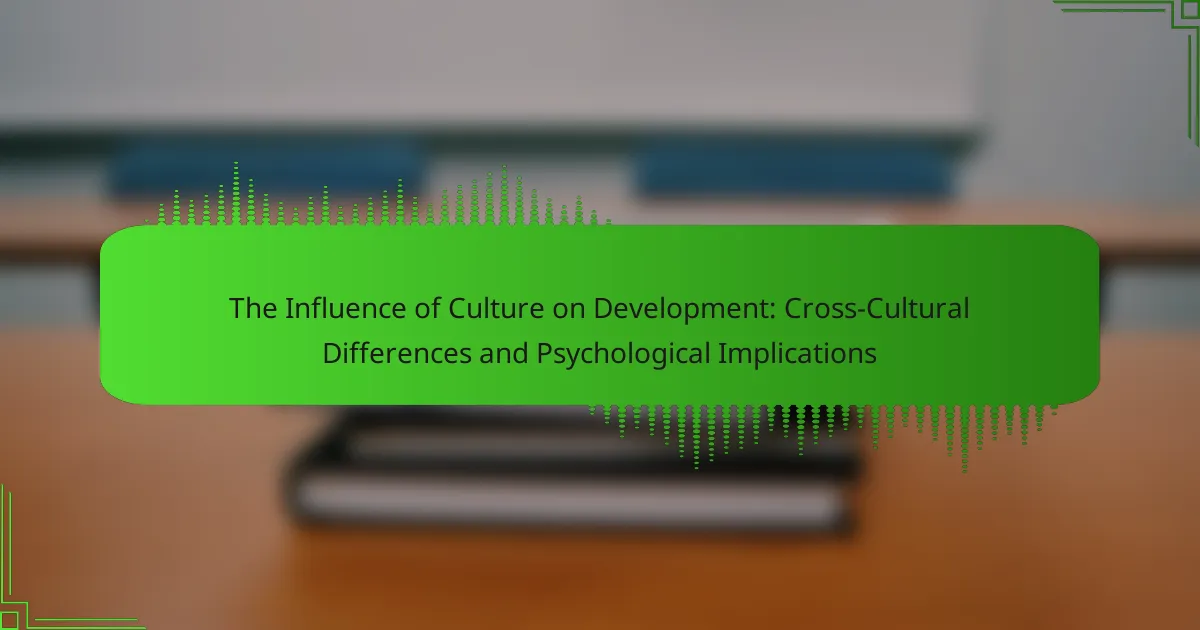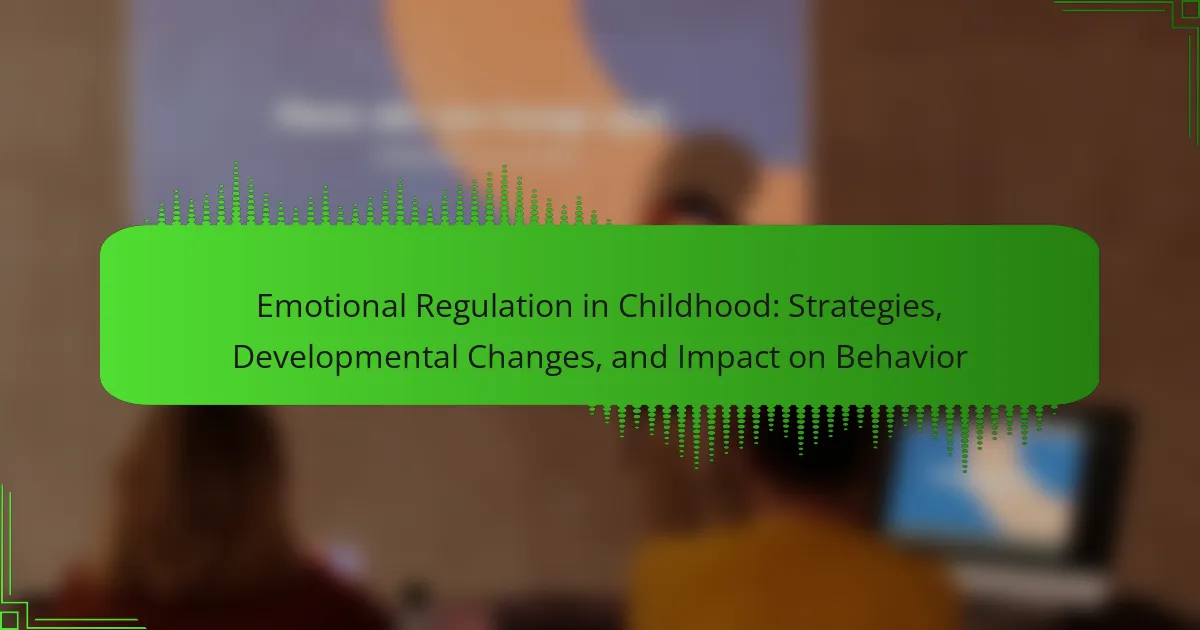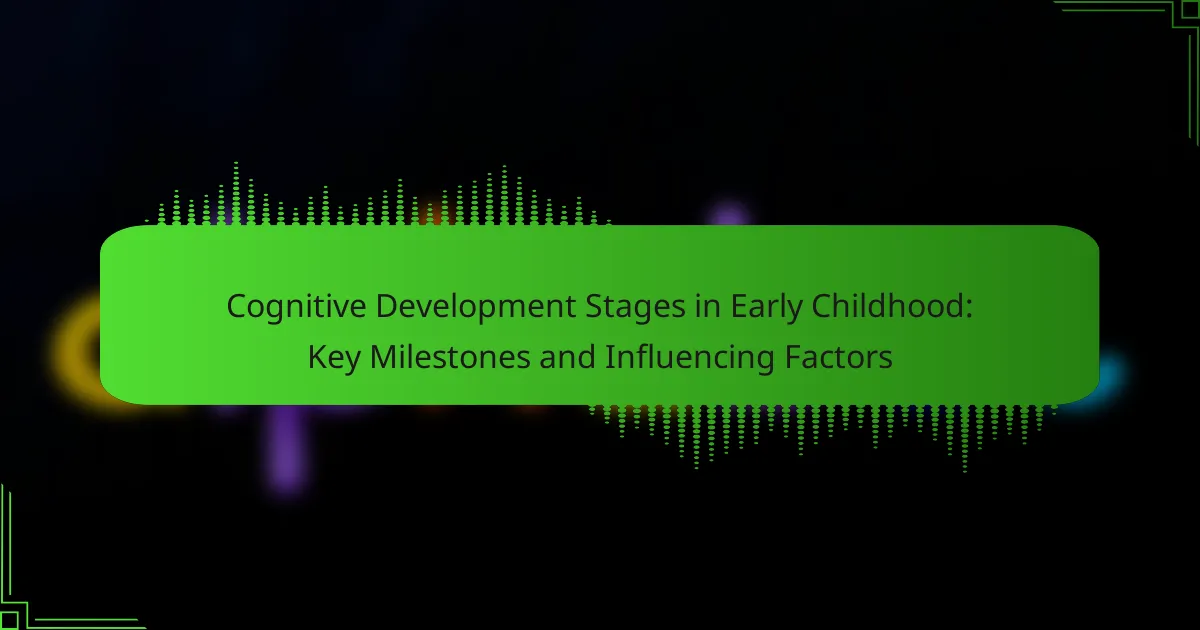The article examines the influence of culture on individual development, highlighting cross-cultural differences and their psychological implications. It explores how cultural contexts shape values, behaviors, and social norms, affecting personal identity and social interactions. Key distinctions are made between collectivist and individualistic cultures, illustrating their impact on cognitive processes, emotional regulation, and educational outcomes. The article emphasizes the significance of understanding these cultural influences for effective communication and the development of culturally sensitive psychological practices. Research findings underscore the varying approaches to problem-solving, communication styles, and mental health perceptions across different cultural backgrounds.

What is the Influence of Culture on Development?
Culture significantly influences development by shaping values, behaviors, and social norms. Cultural context determines how individuals perceive themselves and their roles in society. For example, collectivist cultures emphasize group harmony, affecting personal development and social interactions. In contrast, individualistic cultures prioritize personal achievement, influencing self-esteem and motivation. Research shows that cultural upbringing impacts cognitive processes and emotional regulation. Studies indicate that children raised in different cultures exhibit varying problem-solving approaches and communication styles. This cultural influence extends to educational practices and parenting styles, which further shape developmental outcomes.
How does culture shape individual development?
Culture shapes individual development by influencing values, beliefs, and behaviors. These cultural norms dictate social interactions and personal identity. For example, collectivist cultures emphasize community and family, fostering interdependence. In contrast, individualistic cultures promote self-expression and autonomy. Research shows that children raised in collectivist societies often develop strong social skills and a sense of belonging. Studies indicate that cultural context affects cognitive development, as seen in different problem-solving approaches across cultures. Furthermore, cultural practices impact emotional development, shaping how individuals express and manage feelings. Overall, culture is a fundamental factor in shaping individual growth and development pathways.
What are the key cultural factors influencing development?
Key cultural factors influencing development include values, beliefs, social norms, and traditions. These elements shape individual behaviors and societal structures. For instance, collectivist cultures emphasize community and family, impacting educational and economic outcomes. In contrast, individualist cultures promote personal achievement, influencing innovation and entrepreneurship. Language also plays a crucial role in shaping thought processes and communication styles. Additionally, cultural attitudes toward gender can affect access to education and employment opportunities. Historical context further influences development trajectories, as seen in post-colonial societies. Understanding these cultural factors is essential for effective policy-making and development strategies.
How do cultural norms affect developmental milestones?
Cultural norms significantly influence developmental milestones by shaping expectations and behaviors during growth. For example, in collectivist cultures, milestones like social cooperation may be prioritized over individual achievements. This can affect children’s social skills and emotional development. Research indicates that children in such cultures often develop strong communal ties earlier than those in individualistic societies. Additionally, cultural practices surrounding education can impact cognitive development timelines. In some cultures, early formal education is emphasized, while others focus on play-based learning. These variations illustrate how cultural context directs the pace and nature of development.
What are the psychological implications of cultural influences?
Cultural influences have significant psychological implications on individuals. They shape identity, behavior, and mental health. Cultural norms dictate acceptable emotional expressions. This affects how individuals cope with stress and trauma. For example, collectivist cultures emphasize group harmony, influencing interpersonal relationships. Research shows that cultural background impacts self-esteem and self-concept. Studies indicate that individuals from individualistic cultures may prioritize personal achievements. Conversely, those from collectivist cultures may derive self-worth from group success. Cultural influences also affect mental health perceptions and stigma. Individuals may experience varying levels of support based on cultural beliefs about mental illness.
How does culture impact psychological well-being?
Culture significantly impacts psychological well-being by shaping values, beliefs, and social norms. These cultural elements influence how individuals perceive themselves and their emotions. For instance, collectivist cultures often prioritize community and family, which can enhance social support and belonging. This support is linked to better mental health outcomes. In contrast, individualistic cultures may emphasize personal achievement, which can lead to stress and anxiety when expectations are not met. Research by Hofstede shows that cultural dimensions, such as individualism versus collectivism, affect coping strategies and mental health perceptions. Additionally, cultural stigma surrounding mental health can either hinder or promote help-seeking behaviors. Therefore, understanding cultural context is crucial for addressing psychological well-being.
What role does culture play in shaping identity and self-concept?
Culture plays a crucial role in shaping identity and self-concept. It provides the frameworks through which individuals understand themselves and their place in the world. Cultural norms dictate values, beliefs, and behaviors that influence how people perceive themselves. For instance, collectivist cultures emphasize group identity, leading individuals to define themselves in relation to their family and community. In contrast, individualist cultures encourage personal autonomy and self-expression, fostering a more independent self-concept. Research shows that cultural background affects self-esteem, with individuals from collectivist societies often experiencing lower self-esteem compared to those from individualist societies. This demonstrates how deeply intertwined culture is with identity formation and self-perception.

What are the Cross-Cultural Differences in Development?
Cross-cultural differences in development refer to the varying ways in which cultural contexts shape individual growth and socialization. These differences manifest in values, parenting styles, educational practices, and social expectations. For instance, collectivist cultures often emphasize community and familial ties, influencing children’s social development. In contrast, individualist cultures prioritize personal autonomy and self-expression. Research shows that children raised in different cultural environments exhibit distinct cognitive and emotional skills. A study by Chiu et al. (2018) highlights how cultural beliefs directly affect educational outcomes. Thus, understanding these differences is crucial for effective cross-cultural communication and development strategies.
How do developmental practices vary across cultures?
Developmental practices vary significantly across cultures. Cultural values shape parenting styles, education, and socialization. For instance, collectivist cultures prioritize group harmony and interdependence. In contrast, individualistic cultures emphasize personal achievement and independence. Research by Bornstein (2012) in “Cultural Approaches to Parenting” highlights these differences. Parenting practices in Western cultures often focus on fostering autonomy. Meanwhile, Eastern cultures may stress obedience and respect for authority. Additionally, educational approaches differ; some cultures favor rote memorization, while others encourage critical thinking. These variations influence children’s emotional and social development. Overall, cultural context plays a crucial role in shaping developmental practices.
What are the differences in parenting styles among cultures?
Parenting styles vary significantly among cultures. For example, Western cultures often emphasize independence and self-expression. In contrast, many Asian cultures prioritize collectivism and family harmony. Research by Chao (1994) highlights that Chinese parenting focuses on training and discipline. This contrasts with the permissive approaches seen in some Western parenting styles. Furthermore, parenting in African cultures may incorporate communal child-rearing practices. These differences reflect varying cultural values and beliefs about child development. Studies show that these styles influence children’s socialization and identity formation.
How do educational approaches differ in various cultural contexts?
Educational approaches differ significantly across various cultural contexts. In collectivist cultures, education often emphasizes group harmony and cooperation. This contrasts with individualistic cultures, where personal achievement and competition are prioritized. For example, in Japan, the education system focuses on group activities and consensus-building. In contrast, the United States encourages self-expression and independent thinking. Furthermore, teaching styles vary; some cultures favor rote memorization, while others promote critical thinking and discussion. Research shows that these differences can impact student engagement and learning outcomes. A study by Hofstede (1986) highlights how cultural dimensions influence educational values and practices globally.
What are the implications of cross-cultural differences?
Cross-cultural differences can significantly affect communication, behavior, and social interactions. These differences may lead to misunderstandings and conflicts in multicultural settings. For example, variations in nonverbal communication can result in misinterpretations of intent. Research shows that cultural norms influence individual behavior and decision-making processes. In a study by Hofstede, cultural dimensions such as individualism versus collectivism were identified as key factors in shaping behavior. Understanding these differences is crucial for effective collaboration in diverse environments. Organizations that acknowledge and adapt to cultural differences often experience improved teamwork and productivity.
How do these differences affect social interactions and relationships?
Cultural differences significantly impact social interactions and relationships. These differences shape communication styles, values, and behaviors. For instance, collectivist cultures prioritize group harmony, influencing individuals to avoid confrontations. In contrast, individualistic cultures encourage direct communication and assertiveness. Research shows that misunderstandings can arise when individuals from different cultural backgrounds interact. According to a study by Matsumoto et al. (2008), cultural dimensions like power distance and uncertainty avoidance affect interpersonal dynamics. Consequently, these differences can lead to conflict or enhanced collaboration, depending on the cultural context.
What challenges arise from cross-cultural misunderstandings?
Cross-cultural misunderstandings create significant challenges in communication and relationships. These misunderstandings can lead to misinterpretations of intentions and behaviors. For example, gestures considered polite in one culture may be offensive in another. Language barriers exacerbate these issues, causing confusion and frustration. Stereotyping can occur when individuals make assumptions based on cultural backgrounds. This often leads to conflict and tension in diverse environments. Research indicates that 70% of intercultural conflicts stem from misunderstandings. Addressing these challenges requires cultural awareness and sensitivity training. Effective communication strategies can help mitigate the impact of these misunderstandings.

How can we understand the Psychological Implications of Cultural Influences?
Understanding the psychological implications of cultural influences involves examining how culture shapes individual behavior and mental processes. Cultural norms dictate values, beliefs, and practices that affect psychological development. For instance, collectivist cultures emphasize community and relationships, impacting self-identity and social behavior. Research indicates that cultural context influences emotional expression and coping strategies. A study by Markus and Kitayama (1991) highlights differences in self-construal across cultures, showing that Western cultures often promote an independent self, while Eastern cultures foster an interdependent self. These differences can lead to varying mental health outcomes and coping mechanisms. Additionally, cultural narratives and traditions can shape perceptions of mental health and well-being. Understanding these dynamics aids in developing culturally sensitive psychological practices.
What are the effects of cultural identity on mental health?
Cultural identity significantly impacts mental health. It influences self-esteem, coping mechanisms, and social support. Individuals with a strong cultural identity often experience greater resilience. They may also have access to community resources that promote well-being. Conversely, cultural disconnection can lead to feelings of isolation and anxiety. Research indicates that marginalized groups face higher mental health challenges. A study by Williams and Mohammed (2009) highlights the link between cultural identity and mental health outcomes. This connection underscores the importance of cultural understanding in mental health care.
How does cultural stigma impact psychological help-seeking behaviors?
Cultural stigma significantly hinders psychological help-seeking behaviors. Individuals often fear judgment from their community. This fear can lead to feelings of shame and isolation. Research shows that stigma can deter people from accessing mental health services. For example, a study by Corrigan (2004) highlights that stigma affects both the perception of mental illness and the willingness to seek help. In cultures where mental health issues are viewed negatively, individuals may avoid seeking assistance altogether. This avoidance can exacerbate mental health conditions. Consequently, cultural stigma creates barriers to effective treatment and support.
What strategies can promote mental health across cultures?
Culturally sensitive mental health strategies can promote mental health across diverse populations. These strategies include integrating traditional healing practices with modern therapeutic approaches. For example, in many cultures, community support systems play a crucial role in mental well-being. Encouraging social connections can enhance resilience and provide emotional support. Education about mental health can reduce stigma and increase awareness. Training mental health professionals in cultural competence is essential for effective communication and understanding. Research shows that culturally adapted interventions lead to better outcomes in mental health treatment. A study by Sue et al. (2009) highlights the importance of cultural relevance in therapy. These strategies collectively foster an inclusive environment for mental health promotion across cultures.
What practical insights can we gain from understanding culture’s influence on development?
Understanding culture’s influence on development provides practical insights into behavior, learning, and socialization. Different cultures shape values, beliefs, and practices that affect individual growth. For example, collectivist cultures emphasize community and family, impacting children’s social skills. In contrast, individualist cultures promote independence, fostering self-reliance. Research shows that cultural context influences educational approaches, such as collaborative versus competitive learning environments. Additionally, awareness of cultural differences aids in effective communication and conflict resolution. This understanding can enhance global cooperation and improve mental health interventions by tailoring them to cultural needs.
How can educators and practitioners apply cultural insights in their work?
Educators and practitioners can apply cultural insights by integrating culturally relevant materials into their curriculum. This approach enhances student engagement and learning outcomes. For instance, using literature from diverse authors helps students connect with the content. Additionally, incorporating students’ cultural backgrounds into lesson plans fosters inclusivity. Research shows that culturally responsive teaching improves academic performance ([censured], 2010). Educators should also engage with families to understand cultural contexts. This collaboration supports a positive learning environment. Practitioners can utilize cultural insights to tailor interventions that resonate with specific communities. Understanding cultural values aids in effective communication and relationship building.
What best practices can support culturally informed development strategies?
Best practices that support culturally informed development strategies include engaging local communities in the planning process. This ensures that development initiatives align with cultural values and needs. Conducting thorough cultural assessments is essential to understand the specific context of the community. Training development staff in cultural competency enhances their ability to work effectively across diverse cultures. Building partnerships with local organizations fosters trust and collaboration. Utilizing culturally relevant communication methods improves outreach and engagement. Lastly, evaluating the impact of development initiatives through a cultural lens ensures ongoing relevance and effectiveness. These practices are supported by research indicating that culturally informed strategies lead to more sustainable and accepted outcomes in community development.
The main entity of the article is the influence of culture on development, specifically addressing cross-cultural differences and their psychological implications. The article explores how cultural values, beliefs, and social norms shape individual development, including cognitive and emotional processes. It highlights key cultural factors that impact developmental milestones, parenting styles, and educational approaches, while also examining the psychological effects of cultural identity and stigma on mental health. The discussion emphasizes the importance of understanding these cultural influences for effective communication, education, and mental health interventions.



